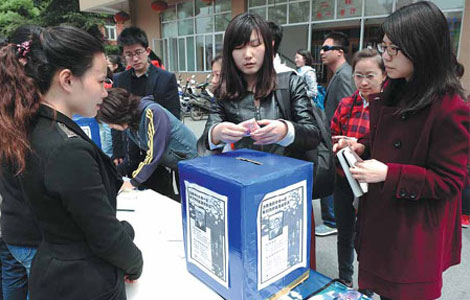Don't shoot the messenger
Updated: 2013-05-06 08:11
By Chen Jinbao (China Daily)
|
|||||||||||
Short selling by international investors is another sign that there are risks building up in China's economy
Due to the negative outlook on China's economy held by some international rating agencies, international investors such as JP Morgan Chase & Co and Citigroup recently launched a new round of short selling Chinese shares, causing the Shanghai Composite Index to drop to 2177.91 points on April 26 and fluctuate around 2220 points in the following trading days.
The tumbling A-share market has aggravated market panic and caused some to denounce such short selling as a plot by international investors to buy into China's stock market at cheap prices by spreading pessimism about China's economy first.
The negative outlook on China's economy by international rating agencies and investors can be attributed to its weak recovery to a large extent. China's gross domestic product grew only 7.7 percent year-on-year in the first quarter, lower than market expectations. Economic deceleration, together with a further decline of the April Purchasing Managers' Index, means the world's second-largest economy will likely face deflationary pressures than inflationary pressures in the months ahead.
International investors also consider local government debt to be a huge risk hanging over the economy as there is still no clear plan in place to resolve the problem. The low growth in local governments' land and tax revenues over the past few months have increased concerns that these debts will continue to grow. At the same time, the rise in domestic house prices has increased the risks arising from real estate bubbles.
As well as the possibility of international investors attempting to buy Chinese stocks on the cheap by disseminating a negative outlook on its economy, there is also the possibility that they are taking precautionary measures against possible investment risks in the country. It is common for investors to sell a country's shares if they consider prices will fall. International capital operators will naturally choose to reduce their holdings of Chinese shares or financial products and derivatives denominated with the yuan once they believe systematic risks in the economy are on the rise. We should not simply interpret international investors' short selling of Chinese shares as a kind of conspiracy, because any kind of irrational short selling will possibly let slip the chance of making profits if China's economy can maintain a robust growth momentum.
Instead of over-interpreting the recent short selling of Chinese shares by international investors, we should consider the problems that exist in our economic development.
Despite disagreements over the exact volume of local government debt that exists, there is no disputing the amount already stands very high. According to the data released by the country's auditing authorities, China's government debts are more than 10 trillion yuan ($1.61 trillion). The Chinese Academy of Social Sciences estimates the amount could be 30 to 40 trillion yuan, while the Barclays Group estimates it could be as high as 50.44 trillion yuan, 62 to 97 percent of the country's GDP. Some estimates even suggest it could be more than 100 trillion yuan.
Despite the transparency of its central government debts, the country has not set up a transparent debt-holding mechanism at the local level, and this is exacerbating the risks.
The red-hot real estate market adds to the risks. China's real estate market has come to a dangerous level. The widespread construction boom across the country, mostly funded by bank loans or higher-interest non-governmental financing, means that there will be chain reactions in the Chinese economy once there is a continuous decline in property prices. The risks brought about by economic development dependent on real estate will easily prompt international investors to withdraw once short-term profits are gained.
Also the volume of non-performing lending held by China's commercial banks reached 524.3 billion yuan at the end of March, an increase of 20.7 percent from a year earlier, and the amount is expected to further rise in the future. The debt-holding ratio of China's central enterprises continues to rise to the 70 percent alert line set by the country's state assets watchdog. It is also evidence that China's economy now lacks an intrinsic driving force.
Due to the regulating of cross-border capital flows, international capital still has difficulties short selling Chinese shares. But attention should be paid to the factors that have resulted in the negative outlook on China's economy. Instead of becoming involved in quarrels with foreign investors, we should focus on reducing the risks and uncertainties in our economic system by pushing forward some necessary reforms, such as those aimed at a soft landing for local government debt and the real estate market and the real transformation of its economy.
The author is an economics commentator with the School of Economics and Management under the Beijing University of Science and Technology.
Related Stories
Investors shake off speculation of new listings 2013-05-04 01:17
China unveils guideline for RQFII investors 2013-05-03 09:51
Investors bearish on weak economic data: Analysts 2013-05-02 05:00
Investors find a home in overseas real estate 2013-04-25 02:37
Chinese investors should be welcomed in Germany 2013-04-23 11:15
Today's Top News
Renewed interest in mission to Mars
Suspects accused of selling tainted pork
Xi pins hope on youth for innovation, advancement
China playing bigger role in Middle East
FM wraps up tour on
note of stability
Museum window vandalized
Seawater can save thirsty country
New markets buy big at trade fair
Hot Topics
Lunar probe , China growth forecasts, Emission rules get tougher, China seen through 'colored lens', International board,
Editor's Picks

|

|

|

|

|

|





